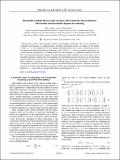Maximally random discrete-spin systems with symmetric and asymmetric interactions and maximally degenerate ordering
Author(s)
Atalay, Bora; Berker, A Nihat
DownloadPhysRevE.97.052102.pdf (716.3Kb)
PUBLISHER_POLICY
Publisher Policy
Article is made available in accordance with the publisher's policy and may be subject to US copyright law. Please refer to the publisher's site for terms of use.
Terms of use
Metadata
Show full item recordAbstract
Discrete-spin systems with maximally random nearest-neighbor interactions that can be symmetric or asymmetric, ferromagnetic or antiferromagnetic, including off-diagonal disorder, are studied, for the number of states q=3,4 in d dimensions. We use renormalization-group theory that is exact for hierarchical lattices and approximate (Migdal-Kadanoff) for hypercubic lattices. For all d>1 and all noninfinite temperatures, the system eventually renormalizes to a random single state, thus signaling q×q degenerate ordering. Note that this is the maximally degenerate ordering. For high-temperature initial conditions, the system crosses over to this highly degenerate ordering only after spending many renormalization-group iterations near the disordered (infinite-temperature) fixed point. Thus, a temperature range of short-range disorder in the presence of long-range order is identified, as previously seen in underfrustrated Ising spin-glass systems. The entropy is calculated for all temperatures, behaves similarly for ferromagnetic and antiferromagnetic interactions, and shows a derivative maximum at the short-range disordering temperature. With a sharp immediate contrast of infinitesimally higher dimension 1+ε, the system is as expected disordered at all temperatures for d=1.
Date issued
2018-05Department
Massachusetts Institute of Technology. Department of PhysicsJournal
Physical Review E
Publisher
American Physical Society
Citation
Atalay, Bora and Berker, A. Nihat. "Maximally random discrete-spin systems with symmetric and asymmetric interactions and maximally degenerate ordering." Physical Review E 97, 5 (May 2018): 052102 © 2018 American Physical Society
Version: Final published version
ISSN
2470-0045
2470-0053